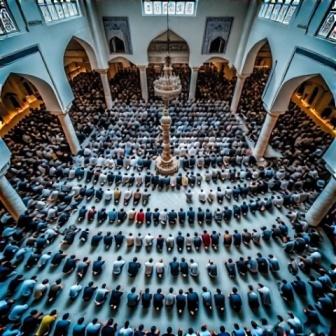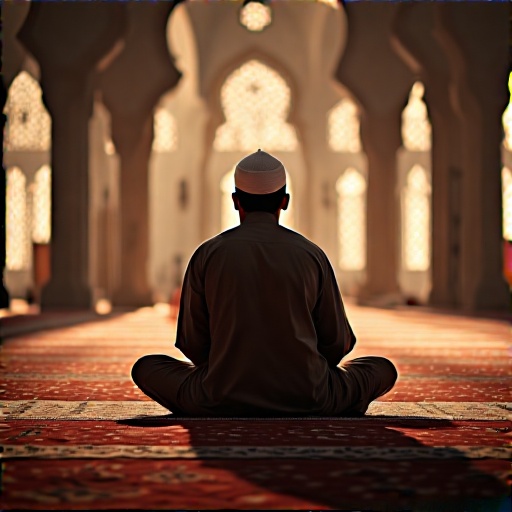Salah, the Islamic prayer, stands as one of the Five Pillars of Islam and is a central act of worship for every Muslim. It is not only a daily ritual but also a powerful symbol of faith and submission to Allah. In the teachings of the Quran and the authentic sayings of Prophet Muhammad (PBUH), Salah is described as the clear dividing line between a Muslim and a non-Muslim. This article explores this profound concept, using direct references from the Holy Quran and Sahih Hadith, and aims to provide a clear, inspiring, and accessible understanding for both Muslims and non-Muslims.
یَـٰۤأَیُّهَا ٱلَّذِینَ ءَامَنُوا۟ ٱسۡتَعِینُوا۟ بِٱلصَّبۡرِ وَٱلصَّلَوٰةِۚ إِنَّ ٱللَّهَ مَعَ ٱلصَّـٰبِرِینَ
O you who believe! Seek help in patience and As-Salat (the prayer). Truly! Allah is with As-Sabirin (the patient ones, etc.).
[2:153]
The Importance of Salah in the Quran and Hadith
Salah as a Pillar of Faith
- Salah is one of the Five Pillars of Islam, making it an essential practice for every believer[6].
- The Quran repeatedly commands believers to establish regular prayers, emphasizing its importance for spiritual growth and discipline.
Quranic Commandments on Salah
حَـٰفِظُوا۟ عَلَى ٱلصَّلَوَ ٰتِ وَٱلصَّلَوٰةِ ٱلۡوُسۡطَىٰ وَقُومُوا۟ لِلَّهِ قَـٰنِتِینَ
Guard strictly (five obligatory) As-Salawat (the prayers) especially the middle Salat (i.e. the best prayer – ‘Asr). And stand before Allah with obedience [and do not speak to others during the Salat (prayers)].
[2:238]
یَـٰۤأَیُّهَا ٱلَّذِینَ ءَامَنُوا۟ ٱسۡتَعِینُوا۟ بِٱلصَّبۡرِ وَٱلصَّلَوٰةِۚ إِنَّ ٱللَّهَ مَعَ ٱلصَّـٰبِرِینَ
O you who believe! Seek help in patience and As-Salat (the prayer). Truly! Allah is with As-Sabirin (the patient ones, etc.).
[2:153]
Hadith on the Centrality of Salah
- The Prophet Muhammad (PBUH) said:
“The difference between us and them (non-Muslims) is Salah. Whoever abandons Salah has committed disbelief.”
(Tirmidhi, Book of Faith, Sahih by Imam Tirmidhi and others)
- Another narration states:
“Between man and polytheism and unbelief is the abandonment of Salah.”
(Sahih Muslim, Book of Faith, Hadith 82b)
- The Messenger of Allah (PBUH) also said:
“The covenant that stands between us and them is the Salah; whoever abandons it has committed disbelief.”
(Sunan an-Nasa’i 463)
Salah: The Line That Divides Muslim and Non-Muslim
What Makes Salah a Defining Line?
- According to the Prophet (PBUH), the act of performing Salah is what separates a believer from a non-believer.
- Abandoning Salah is described in several authentic Hadith as an act that leads to kufr (disbelief) and even shirk (associating partners with Allah).
Quranic Evidence of Salah as a Mark of Faith
فَإِن تَابُوا۟ وَأَقَامُوا۟ ٱلصَّلَوٰةَ وَءَاتَوُا۟ ٱلزَّكَوٰةَ فَإِخۡوَ ٰنُكُمۡ فِی ٱلدِّینِۗ وَنُفَصِّلُ ٱلۡـَٔایَـٰتِ لِقَوۡمࣲ یَعۡلَمُونَ
But if they repent, perform As-Salat (Iqamat-as-Salat) and give Zakat, then they are your brethren in religion. (In this way) We explain the Ayat (proofs, evidences, verses, lessons, signs, revelations, etc.) in detail for a people who know.
[9:11]
- This verse shows that establishing Salah is a condition for being recognized as part of the Muslim community.
Hadith Explanation
- The Prophet (PBUH) said:
“I have been ordered to fight the people until they testify that none has the right to be worshipped but Allah and that Muhammad is Allah’s Messenger, and offer Salah, and give Zakah. If they perform this, they save their lives and property from me except for Islamic laws, and then their reckoning will be done by Allah.”
(Sahih Bukhari, Book of Faith, Volume 1, Book 2, Number 24)
The Spiritual and Social Benefits of Salah
Personal Transformation
- Salah purifies the heart, strengthens faith, and keeps a believer away from immorality and wrongdoing.
- The Quran says:
ٱتۡلُ مَاۤ أُوحِیَ إِلَیۡكَ مِنَ ٱلۡكِتَـٰبِ وَأَقِمِ ٱلصَّلَوٰةَۖ إِنَّ ٱلصَّلَوٰةَ تَنۡهَىٰ عَنِ ٱلۡفَحۡشَاۤءِ وَٱلۡمُنكَرِۗ وَلَذِكۡرُ ٱللَّهِ أَكۡبَرُۗ وَٱللَّهُ یَعۡلَمُ مَا تَصۡنَعُونَ
Recite (O Muhammad SAW) what has been revealed to you of the Book (the Quran), and perform As-Salat (Iqamat-as-Salat). Verily, As-Salat (the prayer) prevents from Al-Fahsha’ (i.e. great sins of every kind, unlawful sexual intercourse, etc.) and Al-Munkar (i.e. disbelief, polytheism, and every kind of evil wicked deed, etc.) and the remembering (praising, etc.) of (you by) Allah (in front of the angels) is greater indeed [than your remembering (praising, etc.) Allah in prayers, etc.]. And Allah knows what you do.
[29:45]
Reward and Success
- Performing Salah brings immense rewards and is the first deed for which a person will be judged on the Day of Resurrection.
- The Prophet (PBUH) said:
“Indeed the first deed by which a servant will be called to account on the Day of Resurrection is his Salah. If it is complete, he is successful and saved, but if it is defective, he has failed and lost.”
(Jami` at-Tirmidhi 413)
Unity and Identity
- Salah unites Muslims worldwide, creating a sense of brotherhood and shared purpose.
- It is a daily reminder of submission to Allah and a visible sign of Islamic identity.
Salah in Daily Life: Practical Guidance
How to Establish Salah
- Perform Salah five times a day: Fajr (dawn), Dhuhr (midday), Asr (afternoon), Maghrib (sunset), and Isha (night).
- Each prayer involves specific movements: standing, bowing, prostrating, and sitting, all symbolizing humility before Allah.
Tips for Consistency
- Set reminders and create a dedicated space for prayer.
- Join community prayers at the mosque for motivation and support.
- Reflect on the meaning of the words and actions in Salah to deepen your connection with Allah.
Reflection
Salah is more than a ritual—it is the heartbeat of Islamic faith. For Muslims, it is the most visible sign of submission to Allah and the key to spiritual success. For non-Muslims, understanding the importance of Salah offers a window into the core of Islamic identity and discipline. Whether you are a Muslim seeking to strengthen your practice or a non-Muslim interested in Islamic beliefs, reflect on the role of Salah in shaping character, community, and connection with the Divine.
Ask yourself:
- What does Salah mean to me?
- How can I make it a more central part of my life or understanding of Islam?
Conclusion: The Everlasting Significance of Salah
Salah is the clear line that divides Muslim and non-Muslim, as established by the Quran and the teachings of Prophet Muhammad (PBUH). It is a daily declaration of faith, a source of strength, and a shield against wrongdoing. By establishing Salah, a person affirms their identity as a Muslim and draws closer to Allah. Let us strive to uphold this pillar with sincerity, understanding, and devotion, and encourage others to appreciate its profound role in Islam.
May Allah guide us all to the straight path and grant us steadfastness in Salah.







